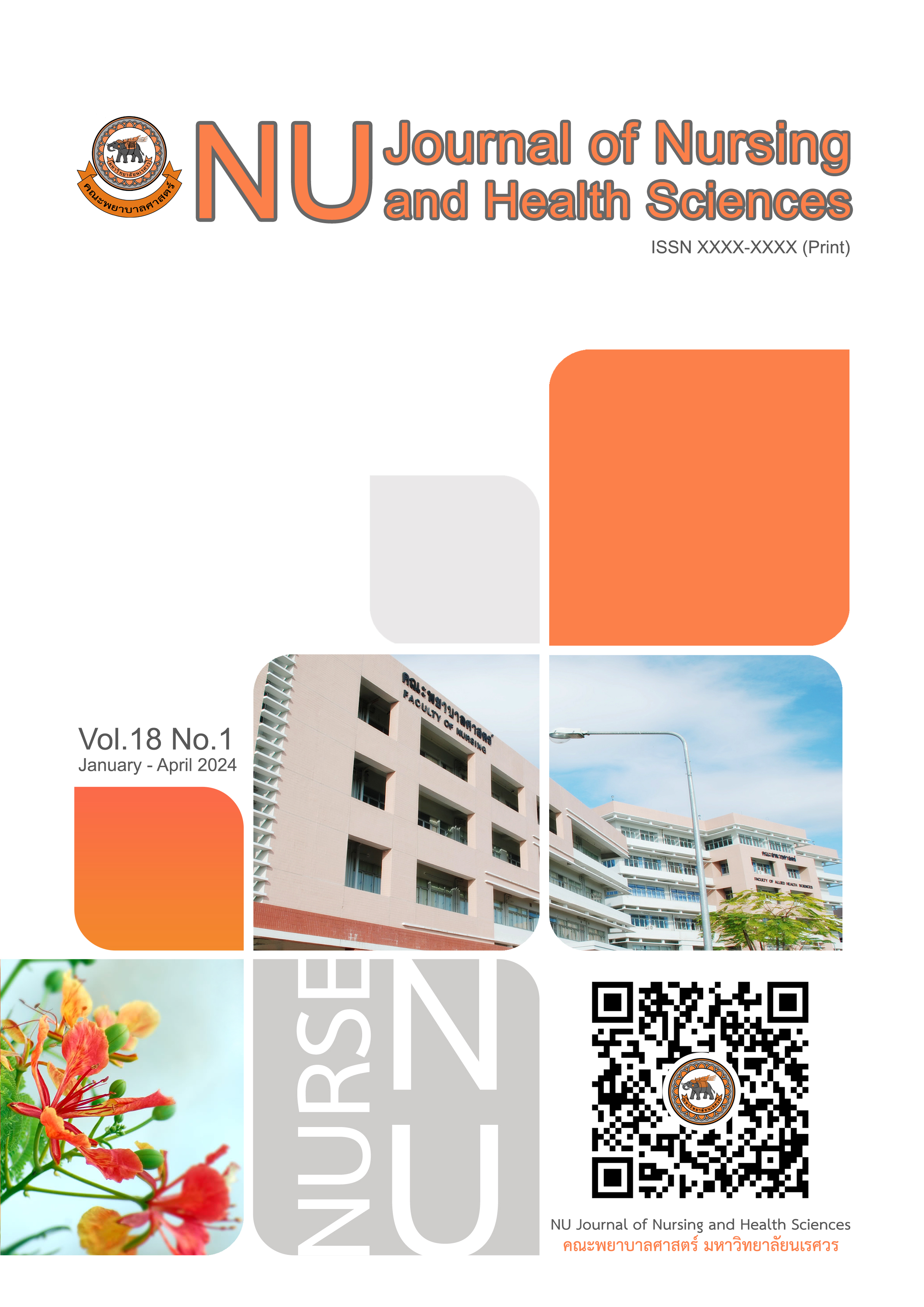ผลของการนวดท้องต่อภาวะที่ไม่สามารถทนต่อการรับนมในทารกเกิดก่อนกำหนด
Main Article Content
บทคัดย่อ
การศึกษานี้เป็นวิจัยกึ่งทดลองแบบสองกลุ่มเปรียบเทียบก่อนหลัง เพื่อเปรียบเทียบภาวะที่ไม่สามารถทนต่อการรับนมในทารกเกิดก่อนกำหนดก่อนและหลังได้รับการนวดท้อง คัดเลือกกลุ่มตัวอย่างแบบสุ่มตัวอย่างอย่างง่ายตามเกณฑ์การคัดเข้า คือ 1) ทารกมีอายุหลังปฏิสนธิ 28 - 36 สัปดาห์ 2) รับการรักษาในหอผู้ป่วยหนักทารกแรกเกิด โรงพยาบาลมหาราชนครเชียงใหม่ จังหวัดเชียงใหม่ 3) ได้รับการใส่สายให้อาหารเพื่อให้นมตั้งแต่วันแรกของการรับนม 4) สัญญาณชีพอยู่ในเกณฑ์ปกติ 5) ได้รับการช่วยหายใจด้วยแรงดันบวกอย่างต่อเนื่องทางจมูกได้รับออกซิเจนหรือหายใจได้เองตามปกติ กลุ่มตัวอย่างจำนวน 32 ราย แบ่งเป็นกลุ่มทดลองและกลุ่มควบคุม กลุ่มละ 16 ราย ระยะเวลาในการศึกษา 8 เดือน เครื่องมือในการดำเนินงานวิจัยประกอบด้วย แผนการนวดท้องใช้วิธีการนวดแบบวิมาลาและการนวดแบบฟิลด์ เครื่องมือในการเก็บข้อมูล คือ แบบบันทึกข้อมูลส่วนบุคคลและแบบบันทึกการรับนม ค่าดัชนีความตรงเชิงเนื้อหาของเครื่องมือในการดำเนินการวิจัยและเก็บข้อมูลเท่ากับ 0.87 และ 0.83 ตามลำดับ วิเคราะห์ข้อมูลโดยใช้สถิติพรรณนาหาค่าความถี่ ร้อยละ สถิติทดสอบ Chi-square test Fisher’s exact test และ T-testผลการวิจัย พบว่า กลุ่มทดลองที่ได้รับการนวดท้องมีภาวะที่ไม่สามารถทนต่อการรับนมน้อยกว่ากลุ่มควบคุมที่ได้รับการพยาบาลตามปกติอย่างมีนัยสำคัญทางสถิติ (p < .05) กลุ่มทดลองหลังได้รับการนวดท้องมีภาวะที่ไม่สามารถทนต่อการรับนมน้อยกว่าก่อนได้รับการนวดท้องอย่างมีนัยสำคัญทางสถิติ (p < .05)ข้อเสนอแนะ การนวดท้องในทารกเกิดก่อนกำหนดสามารถช่วยป้องกันและลดภาวะที่ไม่สามารถทนต่อการรับนมได้ ทีมสุขภาพควรส่งเสริมให้ทารกได้รับการนวดท้องเพื่อให้ทารกสามารถรับนมได้ดียิ่งขึ้น
Article Details

อนุญาตภายใต้เงื่อนไข Creative Commons Attribution-NonCommercial-NoDerivatives 4.0 International License.
เอกสารอ้างอิง
Carter, B. M. (2012). Feeding intolerance in preterm infants and standard of care guidelines for nursing
assessments. Newborn and Infant Nursing Reviews, 12(4), 187-201.
Choi, H., Kim, S. j., Oh, J., Lee, M., Kim, S., & Kang, K. A. (2016). The effects of massage therapy on
physical growth and gastrointestinal function in premature infants: A pilot study. Journal of Child
Care, 20(3), 394-404.
Fanaro, S. (2012). Strategies to improve feeding tolerance in preterm infants. The Journal of Maternal-fetal
& Neonatal Medicine, 25(4), 46-48.
Fanaro, S. (2013). Feeding intolerance in the preterm infant. Early Human Development, 89, 13-20.
Fazli, S. M., Mohamadzadeh, A., Salari, M., & Karbandi, S. (2017). Comparing the effect of non-nutritive
sucking and abdominal massage on feeding tolerance in preterm newborns. Evidence Based Care
Journal, 7(1), 53-59.
McClure, V. S. (2016). Infant massage techniques. retrieved 17 October 2020 from
https://ahc.aurorahealthcare.org/fywb/x08128.pdf.
Mohamed, F. Z., & Ahmed, E. S. (2018). Efficacy of abdominal massage on feeding intolerance of
preterm neonates. American Journal of Nursing Research, 6(6), 371-379.
Perez, K., Valentine, G. C., Nangia, S., Burrin, D. G., Maheshwar, A., Abayneh, M., … Salas, A. (2022).
Advancement of enteral feeding in very-low-birth-weight infants: Global issues and challenges.
Newborn, 1(3), 306-313.
Pirunnet, T. (2019). Feeding in preterm infants. In S. Punnahitanon, (Ed.), Key issues in practice and
improvement in neonatal care (pp. 275-308). Bangkok: Active Print Publishing. [In thai].
Tekgunduz, K. S., Gurol A., Apay, S. E., & Caner, I. (2014). Effect of abdominal massage for prevent of
feeding intolerance in preterm infants. Italian Journal of Pediatrics, 40(1), 89-94.
Thai Maternal and Child Health Network. (2017). Preterm labor. Retrieved 10 October 2020 from
World Health Organization. (2022). Preterm birth. retrieved 18 April 2020 from
https://www.who.int/news-room/fact-sheets/ detail/preterm-birth.


